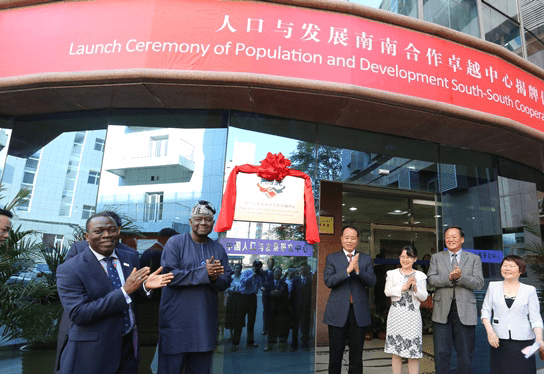The Population and Development South-South Cooperation Center of Excellence was officially launched at the China Population and Development Research Center during the Belt and Road Forum for International Cooperation in Beijing.
With support from UNFPA, the United Nations Population Fund, and NHFPC, the National Health and Family Planning Commission, the Centre of Excellence will be a knowledge hub, fostering exchanges of research, training, good practices and lessons learnt in population and development among research institutions and think tanks from developing countries. Launched during the Belt and Road Forum for International Cooperation, the Centre of Excellence will be an important platform to promote South-South and Triangular Cooperation (SSTC) in population and development in the framework of Belt and Road Initiative, in accordance with the global Sustainable Development Goals (SDGs) and in furtherance of the Programme of Action of the 1994 International Conference on Population and Development (ICPD).
Wang Pei’an, Vice-Minister of the National Health and Family Planning Commission, congratulated UNFPA and the CPDRC on the official launch of the PDSSC, and expressed commitment to continue support to make PDSSC a Centre of Excellence with international influence. He stressed that enhanced SSTC in population and development has a significant role to play in achieving the SDGs for many countries. As an active advocate, a key player and a beneficiary of SSTC, China will continue to support the extensive exchanges of experiences and capacity-building to other countries in population and development.
In his remarks at the launch of the PDSSC, Dr. Babatunde Osotimehin, UNFPA Executive Director, emphasized that it was momentous to launch the PDSSC during the Belt and Road Forum hosted in China. He pointed out that the Global South has experienced increasing economic growth in the last decade, resulting in remarkable gains in economic growth, poverty reduction and educational attainments, etc. However, not all countries from the Global South have experienced equal gains in terms of achieving the goals set by the ICPD agenda. Great disparities exist among developing countries, particularly on maternal death, access to contraceptives and child marriage. Other challenges include rapid urbanization, harnessing of the demographic dividend and gaps in population data. With its extensive coverage and all-round investments to foster connectedness among the countries, BRI could be an excellent venue and platform to enhance SSTC to address the above-mentioned challenges and disparities around the world.
SSTC is an integral part of the 2030 agenda and the ICPD Programme of Action. In this era of the global sustainable development goals, these disparities can be addressed through SSTC, and only by addressing them, can the aspirations of the SDGs of leaving no one behind be realized.
Examples of value-added and sustainable SSTC initiatives include fostering exchanges of good practices of rights-based responses to sexual and reproductive health challenges, consisting of prevention of maternal death and disability, health system strengthening, access to reproductive health commodities and information, availability of midwifery services for vulnerable women in impoverished communities. Other priorities can focus on exchanges of appropriate strategies, policies and practices proven to be valuable to reap the benefits of the demographic dividend by investing in young people and girls’ empowerment.
He Dan, the Director-General of the CPDRC, the leading national think-tank on population and development, outlined the blueprint of the PDSSC. In line with national contexts and needs of developing countries, the PDSSC will strive to boost the capacity in the collection and use of population data, and to support countries in integrating population dynamics into social and economic policy-making.
The establishment of the PDSSC is a significant milestone in rolling out the Beijing Call for Action”, a roadmap adopted at the March 2016 Strategic Ministerial Dialogue on South-South Cooperation in Population and Development, jointly organized by the National Health and Family Planning Commission of China, UNFPA and the Partners in Population and Development, and attended by representatives from 24 African and Asian Countries, UN agencies and civil society organizations.
Prior to the official launch of the PDSSC, the CPDRC and Kenya jointly convened the First China-Africa Conference on Population and Development. Focusing on “harnessing a demographic dividend in Africa”, the conference convened in the name of the PDSSC, attracted top demographers and government officials from China and selected African countries to exchange views on how best to harness the demographic dividend by investing in youth and enacting effective policies and programmes aligned with individual countries’ contexts, priorities and universally recognized human rights. Under the auspices of the PDSCC, the conference will be institutionalized to be convened annually.


